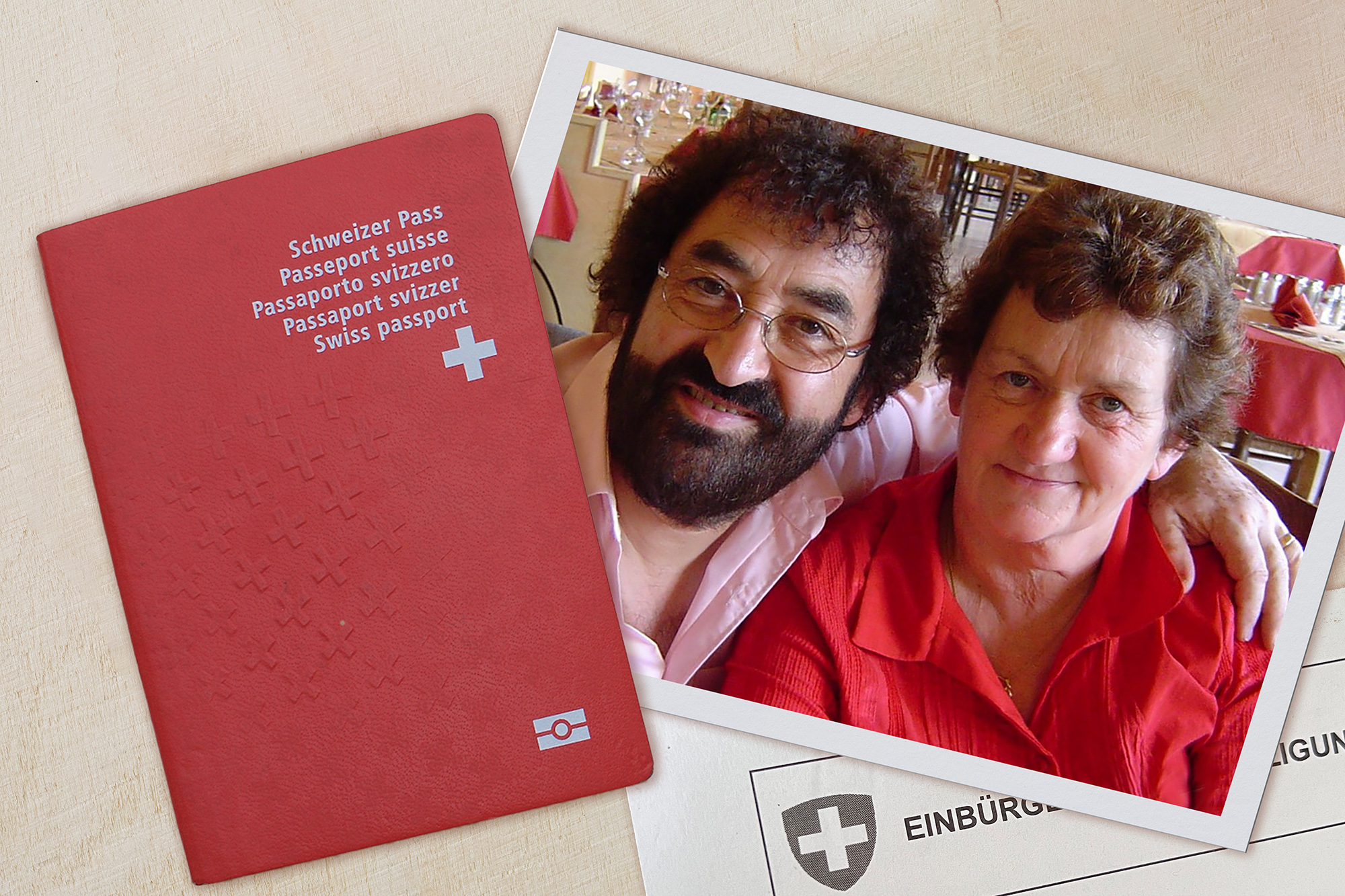Thousands of emigrants’ descendants in Argentina demand Swiss citizenship

Swiss citizenship is meant to be passed down by descent, whether you are born in Switzerland or abroad. However, for thousands of descendants of Swiss emigrants, this right has slipped away. Now, a petition is pushing for change.
Dylan Kunz, 23, is the son of Swiss emigrants. His great-grandparents, hailing from cantons Solothurn and Thurgau, emigrated to Argentina in the 19th century. His grandparents were Swiss citizens, as are four of his five uncles. Yet, neither Dylan nor his father Ruben has a Swiss passport. Ruben unknowingly lost his Swiss citizenship as he missed all the crucial deadlines to retain it.
The family only discovered this in 2021, when Ruben, who was 63 at the time, emailed the Swiss embassy in Buenos Aires about his status. The embassy’s response was a shock: he was no longer Swiss.
“It was a huge disappointment for the whole family, especially for my dad who spent his entire life believing he was Swiss,” says Dylan, who admits he was slightly embarrassed when he learnt his father had lost his Swiss citizenship. “My dad and I always told everyone that Switzerland was the best country in the world and that we were Swiss!”
Birth certificates fail to reach the embassy
The Kunz family had long believed that Ruben, like his older siblings, had been duly registered with the Swiss embassy in Buenos Aires. But Ruben was born in 1958, long before the advent of email, at a time when letters in Argentina were delivered by horse and cart – a system which was far from reliable. The disappointing conclusion the family made was that the Swiss authorities never received the notification of Dylan’s father’s birth, nor that of his brother.

Under Swiss law, any person who is not registered with the relevant Swiss representation abroad or listed in the Swiss civil registry by the age of 25 (in 1958, the age was 22) loses their Swiss citizenship. This was the case for Ruben in 1980, the year he turned 22.
In theory, Ruben could have applied for reinstatement of his Swiss citizenship within ten years, but he missed that deadline as well. After all, he believed he was still Swiss. Now, his only remaining option is to permanently live in Switzerland for three years – a prospect far from realistic. “For many of us who live in Argentina, it’s not just financially impossible, it’s also extremely difficult to obtain a work permit to earn money in Switzerland,” Dylan explains.
When the chain is broken
Not only is Dylan’s father denied a Swiss passport, but Dylan and his future descendants are also excluded. “We have some kind of chain dependence here,” explains citizenship expert Barbara von Rütte. Once the chain is broken, it gets increasingly difficult to regain Swiss citizenship. “The closer you are to the point of losing it, the more likely you are to reclaim it.”
Ruben and Dylan Kunz are not alone in this. Over the past few decades, thousands of descendants of Swiss emigrants have faced the same situation. “Swiss citizenship is based on the principle of ius sanguinis,” says Rütte. In other words, citizenship is passed down by descent, regardless of where you were born. “Our law allows for Swiss citizenship to be passed on through generations, as long as the birth is registered.”
>>> Gender discrimination continues to this day:

More
Swiss citizenship: discrimination against women continues
Many descendants of Swiss emigrants find these requirements too strict. In order to loosen things up, a group led by Dylan Kunz launched a petition gathering signatures from around 110 Swiss citizens living abroad as well as 11,500 descendants of Swiss emigrants. It was submitted to the Federal Assembly in July 2024.
You can find useful articles on emigrating and living abroad in our Guide to moving abroad.
‘Descendants face discrimination!’
“We call on the Federal Assembly to review and reform Swiss citizenship laws to make it easier for Swiss descendants up to the fifth generation to gain citizenship,” says the text, which aims to simplify procedures and reduce bureaucratic barriers. It also claims that the current law discriminates against Swiss nationals abroad due to strict restrictions on retaining their nationality.
“Until the early 20th century, Switzerland was a country of emigration,” says von Rütte. This is why many Swiss nationals now live abroad in the fifth or sixth generation. While many of them have lost their Swiss citizenship for various reasons, others have managed to keep it and pass it down to their family members.
The question is whether it is really that difficult to contact an embassy or a consulate before the age of 25. “This is not a current problem, but a historical one,” says Eduardo Puibusque who submitted the petition on behalf of Dylan’s group “Nacionalidad Suiza Para DescendientesExternal link”. While communication is now fast and information travels quickly, this was not always the case, he explains.
Many lost their citizenship for lack of awareness
“We have to bear in mind that most Swiss emigrants did not settle in cities but in rural areas,” Puibusque says. Argentina is a huge country where people have to cover vast distances, and “even today, it’s a challenge to travel across Argentina”.
The lack of awareness, often caused by limited access to information, resulted in many people losing their citizenship over the years – “and this didn’t happen just in rural areas,” he adds. Puibusque cites the various legal changes that were introduced over decades as another contributing factor.
Puibusque himself had to fight to regain his Swiss citizenship. His mother lost hers when she married an Argentine national in the 1940s.
>>> Until 1952, Swiss women who married a foreigner lost their Swiss citizenship:

More
The terrible fate of Swiss women who lost their nationality
But Puibusque was lucky to benefit from a transitional provision in Swiss citizenship laws that allowed him and his sister to reclaim their Swiss passports. His three children and six grandchildren, however, no longer have access to Swiss citizenship. “By the time I had finally reclaimed my Swiss passport, my three children were already older than the arbitrarily set age limit,” he says.
For many descendants, regaining access to Swiss citizenship now comes with significant hurdles.

The petition calls for a change in the law. It demands that descendants of Swiss citizens abroad – ideally up to the fifth generation of blood relations – be allowed to become Swiss without major obstacles such as age limits or financial requirements.
“There used to be more transitional clauses that made it easier to reclaim Swiss citizenship,” says von Rütte. These provisions mainly applied to Swiss citizens who had lost their nationality owing to gender discrimination. However, these regulations became increasingly complex, which led to their consolidation and simplification in 2017. “The idea behind it was that most cases affected by these provisions should have been resolved by now.”
But this does not seem to be the case. “We are uncles, aunts, sons, daughters and grandchildren,” says Kunz. They have all lost or forfeited their Swiss citizenship. “We don’t want any benefits by being Swiss. It’s about our identity and our connection to our homeland.”
Edited by Balz Rigendinger. Adapted from German by Billi Bierling/ts
According to article 33 of the Federal Constitution, every citizen can submit a petition to the authorities. No matter whether the petition is submitted in writing or online, it is not legally binding. The authority receiving the petition has to confirm receipt, but it is not obliged to process or respond to it. In practice, though the authorities usually process.
More

In compliance with the JTI standards
More: SWI swissinfo.ch certified by the Journalism Trust Initiative











You can find an overview of ongoing debates with our journalists here . Please join us!
If you want to start a conversation about a topic raised in this article or want to report factual errors, email us at english@swissinfo.ch.